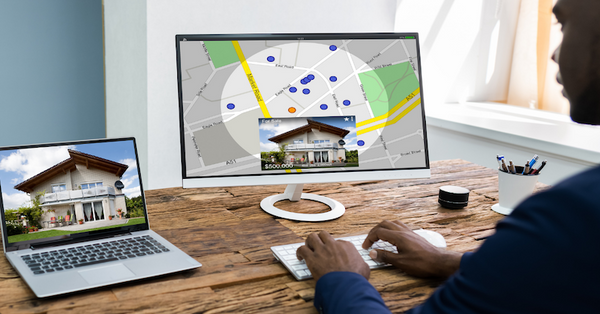“How much house can I afford?”
When you begin asking that question, your house-hunting journey has become serious. You’ve moved on from just thinking about buying a new home and have taken the first step toward actually doing so.
Fortunately, if you follow the below advice, you’ll know exactly how much you can spend on your house.
The 3 Factors That Decide How Much House You Can Afford
The good news is that figuring out how much house you can afford isn’t rocket science. It’s actually pretty easy to come up with a firm number, so you’ll feel confident during your search.
Just pay attention to these three factors.
1. Begin with Your Budget
The obvious place to start with such a big purchase is your budget. After all, you can’t spend what you don’t have.
So, get clear about what you – and, if you have one, your partner – make every month. For some of you, this might be as easy as looking at your latest pay stub.
For others, it might be a bit more complicated. If you earn a commission, for example, take your average paycheck for the past six months.
Be sure to include every stream of revenue, too. This would even include things like alimony payments and investment dividends.
Go through this exercise even if you already have a monthly budget. It never hurts to doublecheck and, when it comes to deciding how much you can spend on a house, it is always better to be safe than sorry.
2. Your Savings
It probably wouldn’t be wise to factor in your savings as a means for making monthly mortgage payments. Those funds would eventually become depleted, at which point, your income will have to suffice.
That being said, your savings can help with the down payment. The more you’re able to pay down right away, the less your monthly mortgage payments will be, which will also mean you can afford more house.
As such, if you haven’t begun saving for a home, now would be a good time to start. It can make all the difference when you eventually decide to purchase your house.
3. Your Current Expenses
Finally, you want to calculate your monthly expenses.
Again, if you already have a monthly budget, you most likely know what you’re spending every month on things like groceries, utilities, and your phone bill.
Still, it’s definitely worth double checking.
Leave out rent, though.
If you can’t break your lease, you might have some overlap when you’re paying your rent and your mortgage. However, that won’t last forever, so your monthly rent shouldn’t factor into how much house you can afford.
Putting It All Together
Once you have these three numbers, you’re just some basic math away from knowing what your budget looks like.
First, subtract your monthly expenses from your monthly income. What’s left over is what you could spend every month on your mortgage. Perhaps it’s $1,000.
Then, pick the terms you want for a mortgage, either 20 or 30 years for most people. Say you opt for 30 years.
In that case, you could afford a $360,000 ($1,000 x 12 x 30) house.
Of course, you also have your savings to consider. Maybe you’re willing to use $20,000 for the down payment, which would drop your monthly payments to about $945 a month.
Or you could use it as a down payment on a house that costs $380,000 and keep your monthly mortgage payments at $1,000.
Applying the 28/36% Rule
Another extremely helpful way to determine how much you can spend on a house is by applying the 28/36% rule.
Here’s how it works:
28% of your monthly income can be used on housing expenses or PITI:
- Principal
- Interest
- Taxes
- Insurance Payments
36% of your monthly income can be used for all debt, including PITI as well as car payments, student loans, credit card payments, etc.
So, if you make $5,000 a month, this rule would suggest you only spend $1,800 of it on all debts ($5,000 x .36), $1,400 of which can be used for your mortgage-related payments. ($5,000 x .28).
Many underwriters actually use this guideline when deciding how much to lend you, but it’s not a hard-and-fast rule. Some lenders will approve a mortgage even if your debt-to-income ratio is above 50%.
Locking in the Best Possible Interest Rate
The higher your interest rate, the more expensive your mortgage, and the less you’ll be able to spend on a house. As we just mentioned the debt-to-income (DTI) ratio, let’s start there.
Debt-to-Income Ratio
As the name suggests, your debt-to-income ratio compares how much you make a month with how much you owe every month. You can use bank statements, tax returns, or pay stubs to prove how much you make per month. If you’re a sole proprietor and don’t have access to traditional paystubs, you can use free PDF pay stubs to show your proof of income.
Lenders are wary of people with high DTIs because it’s more likely they’ll have trouble keeping up with payments. Consequently, the higher your DTI, the higher your interest rate will be to make up for this perceived risk.
Credit Score
Your credit score will also impact how much you’ll pay in interest for your mortgage. Just like your DTI, lenders look at your credit score as an indication of what you’ll be like as a borrower. The better your score, the better they’ll feel about your ability to pay them back.
If you haven’t recently, pull your credit score. No matter what it reports, go through it to check for possible errors and file a dispute if you find any.
Down Payment
Lastly, a sizable down payment can do more than just lower what you’ll owe every month on your mortgage. It will also reduce how much interest you’re charged.
That’s why, if you’re only able to cover the minimum amount required by a lender, you may want to wait until that changes. While it would require you to save more now, it will literally save you more every month as you make mortgage payments over the next 20-30 years.
Get Help from an Experienced Real Estate Agent
Once you have your budget, you can begin looking for your dream house. A qualified real estate agent can also review the numbers to make sure your budget is sound.
Fortunately, if you use SimpleShowing, you’ll not only get the help of an experienced, local agent, but you’ll also qualify to receive $5,000 on average towards your closing costs when you buy any home.
Contact us today to learn all about how it works.
Conclusion
Understanding how much house you can afford is more than just considering the purchase price. It's about the full picture - considering monthly mortgage payment, factoring in property taxes, homeowners' insurance, private mortgage insurance, and the potential of unexpected closing costs. Even beyond these expenses, your total monthly debt including loans, credit cards, and other obligations play a critical role in your financial wellbeing. Take a deep dive into your monthly debt payments divided by your gross monthly income to ensure you are not overextending yourself.
Whether you opt for a conventional mortgage loan, an FHA loan, or a VA loan, your monthly payment shouldn't exceed 28% of your gross monthly income. This is a general rule that lenders use to assess your borrowing capacity. FHA loans, in particular, may allow higher debt-to-income ratios, giving first-time buyers more flexibility. But regardless of the loan type, staying within these parameters will help ensure that your home purchase is a sound financial decision.
Lastly, to simplify the process, consider using a home affordability calculator. These tools integrate multiple factors such as income, monthly debt payments, and expected home costs to provide an estimate of the home price you can afford. While these calculators can provide a good starting point, they can't account for all individual circumstances, so a consultation with a mortgage professional can provide a more accurate assessment. By doing this careful planning and budgeting, you'll be well-prepared to make one of the most significant financial decisions of your life.






